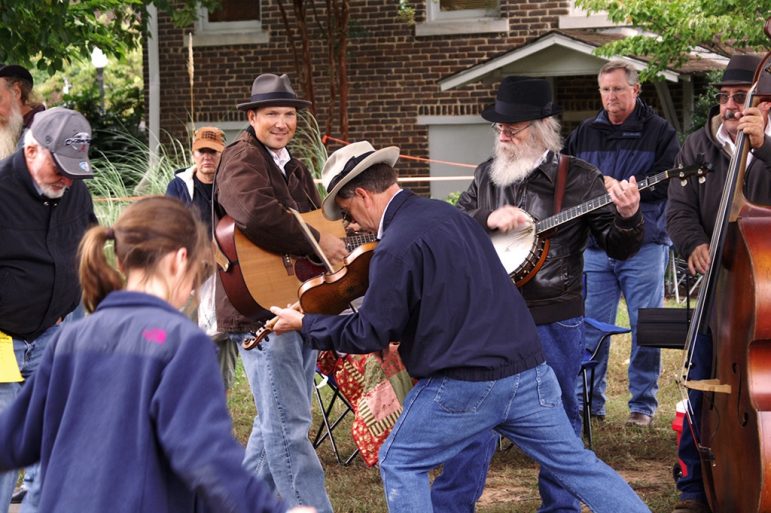Limestone County, Alabama has a long and storied old time fiddling tradition. This past weekend, about 15,000 fiddlers and old time music fans gathered for the 49th annual Tennessee Valley Old Time Fiddlers Convention in Athens.
RV’s from around the country loaded with fiddles, guitars, and banjos filled the campus of Athens State University. The convention and competition bring together musicians of all ages.
Caleb Bryant is a young fiddler from Northport, Alabama. He’s warming up to compete for the title of Best Apprentice Fiddler in the 11 to 15-year-old age bracket. He says this is his toughest competition of the year.
“It’s probably the biggest one I go to,” he says. At 14-years-old, Caleb won this division 3 times, including last year.
Watching from the crowd, Caleb’s grandfather, Charles Bryant, says fiddling runs in the family.
“He would get a little small broom and he would do like he was playing the fiddle,” Charles recalls. “His grandpa, my dad, was a fiddle player. I don’t know if that’s what got in his mind ‘I can learn to play a fiddle; I want to learn to play a fiddle.’”
In Athens, young players like Caleb offer a glimpse into the future of old time music, a tradition rooted in Alabama’s history. Events like the Tennessee Valley Old Time Fiddlers Convention may seem unique today, but at one time, they were everywhere.
“Old time fiddling in Alabama, in the early days, up until World War II actually, it was a really common thing. Every community had some good fiddlers,” says Joyce Cauthen, author of With Fiddle and Well Rosined Bow, a book about fiddling in Alabama.
Cauthen says the earliest fiddle tunes were inspired by Scottish and Irish music. But American fiddlers developed a distinct style, and many of these first musicians were slaves. Cauthen discovered evidence of this in her research.
“I found letters that say people came to the slave quarters to learn to play the fiddle,” she says. “A lot of our early tunes and the style we play in is really influenced by blacks, even though you don’t see many black fiddlers anymore.”
Cauthen says in the early 1900’s, musicians, black and white, began to explore and create new styles of music. American fiddling declined as the country urbanized.
Sara Love is the archivist at Athens State University. She says a small group in Athens carried on the tradition.
“Times were hard. Local people got together on Friday and Saturday nights, and they’d just play. They jammed,” says Sara. “They had a good time. It grew and grew and grew, and eventually, it outgrew the farm pasture area where they were doing this.”
These intimate jam sessions gave birth to the Tennessee Valley Old Time Fiddlers Convention.
Today, most people don’t come to compete, but they do come to play music.
“I just meld in with the crowd and wherever I can find somebody that will let me enter with my old fiddle, then I’ll play with them,” says Lomax Austin, a 94-year-old fiddler from Columbus, Georgia. “You meet a lot of beautiful people, not physically, but in their personality, their stability. It’s kinda nice to get around people like that. Hopefully some of it will rub off on you from time to time.”
Caleb Bryant and the younger fiddlers agree the best part of the convention is playing with other musicians.
“Before I go on stage, back stage practicing with my guitar player and all that, yeah that’s really fun,” he says.
After performing in the finals, Caleb placed fourth in his division. He’s planning to return next near, when the crowds will likely be even bigger in celebration of the convention’s 50th Anniversary.
For many, old time music represents a lifestyle rooted in the past. But in places like Athens, the tradition is very much alive, as musicians, young and old, continue to come together and make music.

